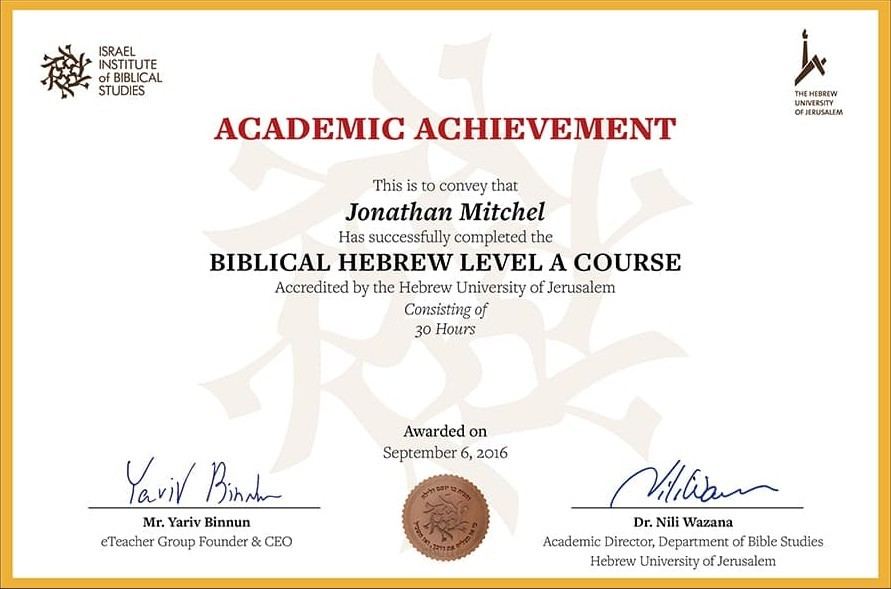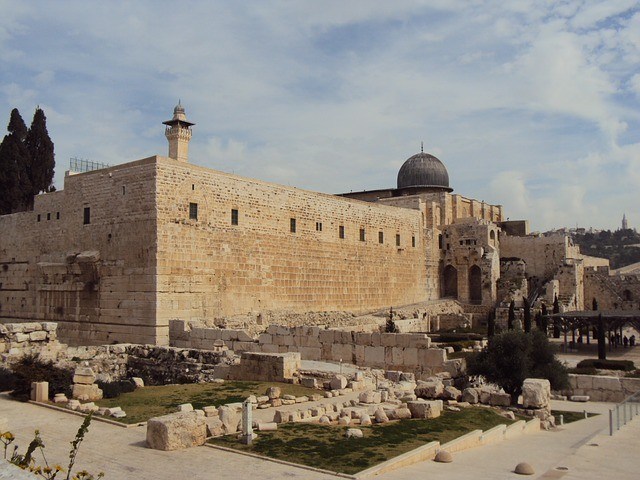
Biblical Hebrew can be a very interesting language to learn, but can seem very off-putting to when searching for places to learn it. There are a multitude of options online, and it can get very confusing trying to decide which place is the best for taking biblical Hebrew online classes. Some places don’t offer quality courses online for a reasonable price. Here, you can find the absolute best place to take classes like this today.
We’ll be going through these courses as if you have no experience in any Hebrew language whatsoever to help you decide if this is the best course for you as a beginner.
The School

The Israel Institute of Biblical Studies offers aside from Biblical Hebrew courses, about which we will speak in a moment, also courses in Biblical Greek, Aramaic, Modern Hebrew, and Yiddish. Bible, Jewish, and Holy Land studies are also viable options for those with an interest in Hebrew. The courses aren’t lacking any sort of academic or teaching quality either.
[Are you interested in learning Biblical Greek? Read here my review on this topic. If you want to learn Aramaic, this article shows you how you can learn Aramaic online.]
If you’re looking for a place to start, this one isn’t bad. It’s a school whose main goal aside from teaching you Biblical Hebrew, is helping you better understand the Bible, and the lands that the stories were told on. This means you will be able to interpret the text yourself if you choose this school. Which in and of itself is quite an achievement, and something you will most certainly be proud of. Who else do you know that is fluent in Biblical Hebrew?
A very nice bonus is the fact that every course you take here is worth three credits at the Hebrew University. Not only will you get in-depth knowledge and guiding, but your skills come with an accredited certificate you can use to help show off your fluency in Biblical Hebrew. This should really give you an idea of how serious the teachers here take this method.
The method is simple. You log on for two hours out of the week, for nine months in a video class with your peers that are connected all over the world. Webinars and live-practice sessions are available to expand your knowledge of whatever topic you are learning. It was made to be convenient, and it is, by letting you take high-quality classes in the comfort of your living room.
You can engage with your peers through the discussions and forums available on the site anytime. Learn from other teachers on the site, and even read their blogs to gain a better understanding of who you are learning from, and what topics you could be touching on in the future. This is part of what really makes this school stand out from all the others on the internet. The boards are open 24/7, so no matter what time you have a question, you can always find the answer.
You’ll also have a ton of resources at your disposal, that you can use at any time. Listen to recorded videos, read an article, or even educational videos. If you have any questions about your material, chances are you can find it there.
Teachers and Students
The teachers here are vital for making the method work. Each one has years of experience to help you through your courses. Interested in Yiddish? Daniel Birnbaum can help you get started. Feeling like you could use a brush up on your Modern Hebrew? Aliza Tal has over 11 years teaching to get you on track. Keep a lookout for Biblical Teachers, like Judith Green, who specializes in the courses we’ll be going over today.
 But what do the students have to say? How do I know that I can trust everything I’ve read? You’ll be happy to know that the site is well praised by its students. Many of the students talk about how they thought learning the language would be an impossible task, but the teachers quickly helped them with getting on track and helping them with their problems. You could join these students and find out yourself, with classes that are certified.
But what do the students have to say? How do I know that I can trust everything I’ve read? You’ll be happy to know that the site is well praised by its students. Many of the students talk about how they thought learning the language would be an impossible task, but the teachers quickly helped them with getting on track and helping them with their problems. You could join these students and find out yourself, with classes that are certified.
Biblical Hebrew- Level A
You’ll start here as a beginner, with you ending as a fluent speaker in Biblical Hebrew. Make it a habit to really get to know your teachers and peers as you go along, and review the academic content you have available to get you prepared for the later levels.
Your first module will teach you the history of the Hebrew Alphabet. You will also learn about the relationship of this alphabet with the Latin alphabet throughout history and its first eight letters. At the end of your second module, you will know the alphabet in its entirety. Vowels will be up next, spanning two modules and giving you the chance to read short fragments from Genesis.
Adjectives, nominals and non-nominals, and definite articles start to pop up after you get used to your basic verbs and nouns. They’re giving you the basics for now, and every bit of what they say is going to be built upon in either this level with future models, or future levels that bring back what you’ve learned to apply them differently.
Biblical contexts are going to be used to teach you the vocabulary, pronunciation, sentence structure, and the origins of the word. This is going to give you an insight into Israeli culture and history. What better way to learn the language than by also learning the birth of its society?
Biblical Hebrew- Level B
When you make it to this level, you’ve reached the improved status. You’ve gotten over 20 courses under your belt so far, and by now the confidence to continue learning should be set in place.
The depth of the words in this course is going to be something you’ll spend a lot of time on. The true meaning of the words and biblical stories are taught to help you better understand your new language. This gives you a solid foundation to build the rest of your skills.
Your first five courses will teach you about Jonah, and serve as a review of the material that you learned in the prior level. Vocabulary pertaining to body parts, kingdoms, and animal groups will be focused on in these modules too. These get rounded off by learning about participles and imperatives.
The story of Moses comes into play when stressing the importance of the historical and cultural sides of the language. The verses in this story cover some rules that you learned from Jonah, and visits participles and imperatives again to help you better understand them for future courses. You’ll find more Biblical references as a guide later on in this level.
The lesson ends at its 30th module. It ends with you learning the relative clauses, dual forms, numbers, and pronominal suffixes. The story of Isaac shows up here to focus on verb forms and other grammatical subjects.
Biblical Hebrew- Level C
Things will start to pick up the pace, and they should, because after taking this course you would be more than halfway done with your levels in general, and be closer to your goal of fluency.
The story of Samuel is told here with it starting off with King David being a young boy, and how he was anointed as King. This is used to give you another dose of Biblical history to review what you have learned so far in Levels B and A. This will also cover the Hebrew verbal system.
The stories of David continue in the modules, with references to the Hebrew number system and specific interrogatives, and how the narrative surrounds King Saul. It also ends here for a brief moment, with David meeting King Saul, and teaching you about basic conjunctions. A review of past forms and some new ones come in right after.
David vs. Goliath is told to give more attention to the historical side. Asking questions such as “Who were the Philistines?” and “Where did the battle take place?” This acts as an introduction to more verbs, and goes more in-depth with their family.
In module 21, you will learn about the Volitive system, and how someone could express themselves in the third person. This level ends by translating verses from David, and reviews everything you have learned so far in this level.
Biblical Hebrew- Level D
For a school that uses biblical texts to help you grasp the material, they really don’t hold back here. Biblical poetry, philosophies, and wisdom literature are ready to be read and translated. You have the opportunity to read texts that were written centuries ago, as they were written. You start to finally get the chance to translate the text yourself from everything you’ve learned so far.
More specifically, you’ll be reading the Book of Psalms, and the prophecies of Isaiah and Jeremiah. Gaining insight on the poetry techniques from biblical times, your peer discussions will be a bit more complex than you had originally thought.
You’ll start your literary analysis of the genres by starting off with Elijah, and refine your knowledge of the weaker verb groups. Verb forms and their uses are covered with the following modules. This is one of the last times you will review verbs and nouns before finishing this level.
With poetry, you’ll learn about its root in Biblical Hebrew and how Parallelism affects its narrative. It starts to get a bit more complicated when you learn about the linguistic perspective and start to really break down the words in the verses. The narrative of the text begins to become more clear after these few modules.
Biblical Law stands out as an interesting topic to delve into, and how they’re rooted in ancient text. Think you’re done with linguistic perspectives? It comes around again as a formula, and you’ll examine how each expression is used in each law.
Grammar books, both reference, and student, will be heavily used in this level. So make sure you’ve taken proper notes up to this point. Morphology and syntax will be reviewed, as well as indices.
Biblical Hebrew- Level E
After finishing this level, you’ll be fluent in Biblical Hebrew, and your understanding of the Israeli culture should become a good bit more clear. Your knowledge of its history will be enriched. Instead of reading other sources, you can go to THE source yourself, and translate it the way it was written.
The history of Biblical Hebrew is one of the final topics of your last level. Covering how it changed over time, and the Dead Sea Scrolls with extra-Bible literature to view them completely differently. Diaphronics and Synphronics are shown here for the first time, and explained in better detail throughout the modules.
Consonant shifts, and its emphatic stages lead up you eventually learning its Uvulars. Questions like “What are Uvular consonants and how did they shift into the Hebrew language?” are asked. These modules are closed on by reading more archaic poetry.
The dialect of archaic poetry is heavily questioned. You will learn about where they were written, and how that region could have affected the dialect of the poem. Be prepared to dive into how the linguistics affects the morphology and syntax of the archaics.
The level ends with you reviewing how far you’ve come. 1,000 years worth of history and culture have been studied throughout these levels. Ask yourself what changed through the years with things like consonant shifts.

Using What You’ve Learned
It may be hard to believe that you can learn Biblical Hebrew as easily as it’s been outlined. It won’t be a walk in the park. What language is? But you have the right tools and guides to help you learn at a convenient pacing, with amazing goals being realistically attainable.
If you finish the levels, it’s imperative to understand that learning can’t stop outside the classroom. Why take a language that you only plan on using inside the classroom, or when it’s convenient for you? You now have the ability to read one of the oldest books in history.
Connecting with people is vital to helping nurture your fluency. Remember that you can take a variety of classes from this school when you are finished with Biblical Hebrew. Why not take a Biblical Greek class? It’s every bit of possible as this course is, and it will only help you grow yourself.
Everything you can learn here will be a life-long skill. With a consistently praised group of peers and teachers backing you up, this is a safe bet. Making the only real question left – “Why haven’t you started yet?”